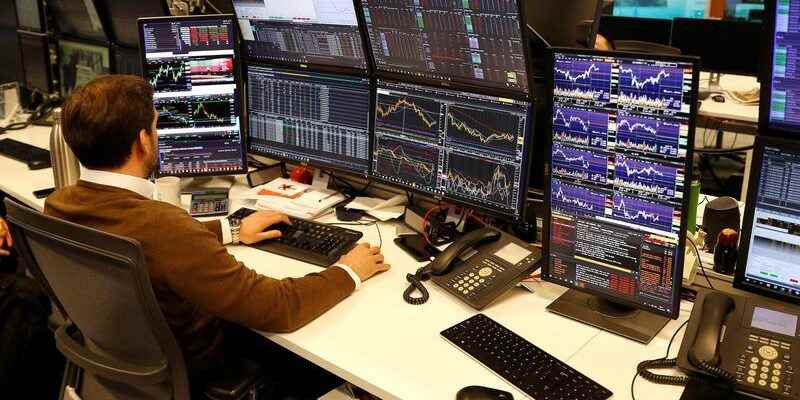by Claude Chendjou
PARIS (Reuters) – The main European stock markets are expected on a hesitant note on Friday in a context of geopolitical tensions, fears over inflation and an increased risk of recession when the statistics of consumer prices in the euro zone are due to be published. for the month of September.
Futures contracts on indices suggest a slight increase of 0.07% for the CAC 40 in Paris, an increase of 0.38% for the Dax in Frankfurt and 0.46% for the EuroStoxx 50. The FTSE 100 at London, on the other hand, is expected to fall by 0.04%.
After the publication of monthly consumer price figures in Germany on Thursday, with a stronger than expected increase of 10.9% over one year, their highest level since 1996, investors will learn at 09:00 GMT of the first estimate. inflation in the euro zone in September. The Reuters consensus expects a further acceleration to 9.7% over one year after rising 9.1% in August.
If this figure were confirmed, fears of another sharp rate hike by the European Central Bank (ECB) should weigh on the markets, with the risk of a hard landing for the economy.
The monthly statistics of household consumption in France will have previously made it possible to get an idea of the evolution of the economic situation in Europe, while in the United States, the publication of household income and expenditure for the month of August is expected at 12:30 GMT.
“Given the current fragility of investor sentiment, it will be interesting to see how they react to any positive surprises (lower inflation, lower incomes and spending) as they have been burned by the price data at July consumption,” writes Craig Erlam, market analyst at OANDA.
On the geopolitical level, Russian President Vladimir Putin is expected to announce this Friday the annexation of four Ukrainian regions during a ceremony, after the organization in these regions of referendums considered by Kyiv and the West as mock consultations.
AT WALL STREET
The New York Stock Exchange ended Thursday down sharply, again weighed down by fears of recession fueled by the aggressive tightening of monetary policies, as well as by turbulence in the foreign exchange and debt markets.
The Dow Jones index fell 458.13 points, or 1.54% to 29,225.61 points. The S&P 500 lost 78.57 points or 2.11% to end at 3,640.47. The Nasdaq Composite ended down 2.84% at 10,737.506 points, near its lowest closing level for the year hit in mid-June.
Meta Platforms, owner of Facebook, fell 3.67% after reports from the Bloomberg agency that the group froze its hiring and warned its employees that it was considering restructuring in an uncertain macroeconomic context.
Tech giants Tesla and Apple fell 6.8% and nearly 5% respectively.
IN ASIA
On the Tokyo Stock Exchange, the Nikkei index ended with a loss of 1.83% to 25,937.21 points and the broader Topix fell 1.76% to 1,835.94 points.
In China, the Shanghai SSE Composite lost 0.32% and the CSI 300 lost 0.35%.
According to the private Caixin survey, the contraction of manufacturing activity in China accelerated in September with a PMI index at 48.1 against 49.5 in August.
Data released by the National Bureau of Statistics (NBS), however, shows Chinese factory activity unexpectedly increased in September after two months of contraction with the PMI reading at 50.1 from 49.4 in August.
RATE
On the Asian markets, the yield on ten-year US Treasury bonds is stable at 3.75%, and the two-year one is at 4.17%, also almost unchanged.
In Europe, bond yields are changing irregularly, that of the ten-year German Bund fell five points to 2.16% after its sharp rise the day before, while the British “gilt” of the same maturity, which took Thursday 12 .9 points to 4.136%, rose slightly on Friday to 4.143%.
CHANGES
In foreign exchange, the dollar, which lost 0.9% on Thursday against a basket of benchmark currencies, fell further by 0.2%, while some traders expect intervention from China and Japan. The greenback has so far gained 2.9% for the month, its best performance since April.
The euro is stable (-0.09%) and trades at 0.9805 dollars.
The British pound is trading at $1.11075 (-0.1%) after falling to an all-time low of $1.03 on Monday. The British currency benefits from the latest statements by Huw Pill, chief economist of the Bank of England (BoE). According to him, the new British bond buying program is not aimed at capping yields or lowering government borrowing costs but at remedying market failures.
British Prime Minister Liz Truss and her finance minister Kwasi Kwarteng are also due to meet the president of the Office for Budget Responsibility (OBR), the independent public finance watchdog, on Friday after a week of severe financial turbulence caused by the government’s draft budget.
OIL
Oil prices are broadly stable with fears over demand offsetting a possible drop in OPEC+ production.
Brent fell 0.15% to $88.36 a barrel, while US light crude (West Texas Intermediate, WTI) edged up 0.09% to $81.16 a barrel.
(Written by Claude Chendjou, edited by Bertrand Boucey and Kate Entringer)
Copyright © 2022 Thomson Reuters
